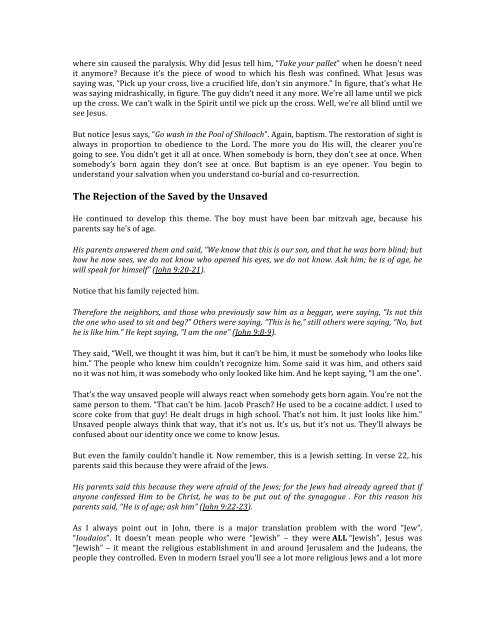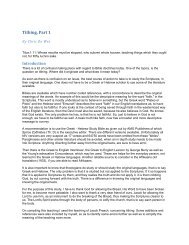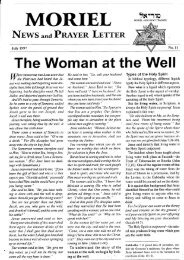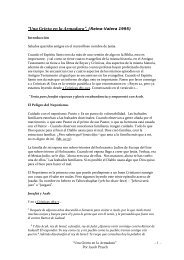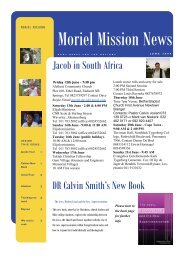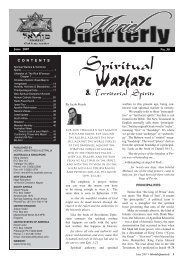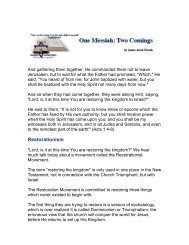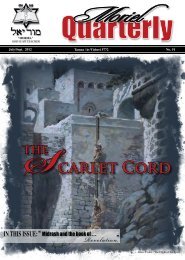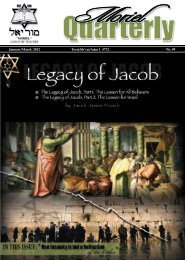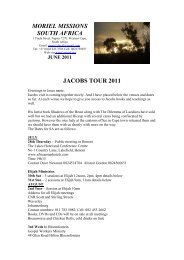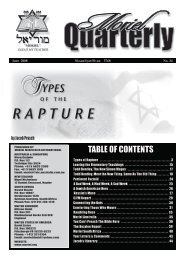Introduction The Traditional Aspect - Moriel Ministries
Introduction The Traditional Aspect - Moriel Ministries
Introduction The Traditional Aspect - Moriel Ministries
You also want an ePaper? Increase the reach of your titles
YUMPU automatically turns print PDFs into web optimized ePapers that Google loves.
where sin caused the paralysis. Why did Jesus tell him, “Take your pallet” when he doesn’t need it anymore? Because it’s the piece of wood to which his flesh was confined. What Jesus was saying was, “Pick up your cross, live a crucified life, don’t sin anymore.” In figure, that’s what He was saying midrashically, in figure. <strong>The</strong> guy didn’t need it any more. We’re all lame until we pick up the cross. We can’t walk in the Spirit until we pick up the cross. Well, we’re all blind until we see Jesus. But notice Jesus says, “Go wash in the Pool of Shiloach”. Again, baptism. <strong>The</strong> restoration of sight is always in proportion to obedience to the Lord. <strong>The</strong> more you do His will, the clearer you’re going to see. You didn’t get it all at once. When somebody is born, they don’t see at once. When somebody’s born again they don’t see at once. But baptism is an eye opener. You begin to understand your salvation when you understand co-‐burial and co-‐resurrection. <strong>The</strong> Rejection of the Saved by the Unsaved He continued to develop this theme. <strong>The</strong> boy must have been bar mitzvah age, because his parents say he’s of age. His parents answered them and said, “We know that this is our son, and that he was born blind; but how he now sees, we do not know who opened his eyes, we do not know. Ask him; he is of age, he will speak for himself” (John 9:20-‐21). Notice that his family rejected him. <strong>The</strong>refore the neighbors, and those who previously saw him as a beggar, were saying, “Is not this the one who used to sit and beg?” Others were saying, “This is he,” still others were saying, “No, but he is like him.” He kept saying, “I am the one” (John 9:8-‐9). <strong>The</strong>y said, “Well, we thought it was him, but it can’t be him, it must be somebody who looks like him.” <strong>The</strong> people who knew him couldn’t recognize him. Some said it was him, and others said no it was not him, it was somebody who only looked like him. And he kept saying, “I am the one”. That’s the way unsaved people will always react when somebody gets born again. You’re not the same person to them. “That can’t be him. Jacob Prasch? He used to be a cocaine addict. I used to score coke from that guy! He dealt drugs in high school. That’s not him. It just looks like him.” Unsaved people always think that way, that it’s not us. It’s us, but it’s not us. <strong>The</strong>y’ll always be confused about our identity once we come to know Jesus. But even the family couldn’t handle it. Now remember, this is a Jewish setting. In verse 22, his parents said this because they were afraid of the Jews. His parents said this because they were afraid of the Jews; for the Jews had already agreed that if anyone confessed Him to be Christ, he was to be put out of the synagogue . For this reason his parents said, “He is of age; ask him” (John 9:22-‐23). As I always point out in John, there is a major translation problem with the word “Jew”, “Ioudaios”. It doesn’t mean people who were “Jewish” – they were ALL “Jewish”, Jesus was “Jewish” – it meant the religious establishment in and around Jerusalem and the Judeans, the people they controlled. Even in modern Israel you’ll see a lot more religious Jews and a lot more


